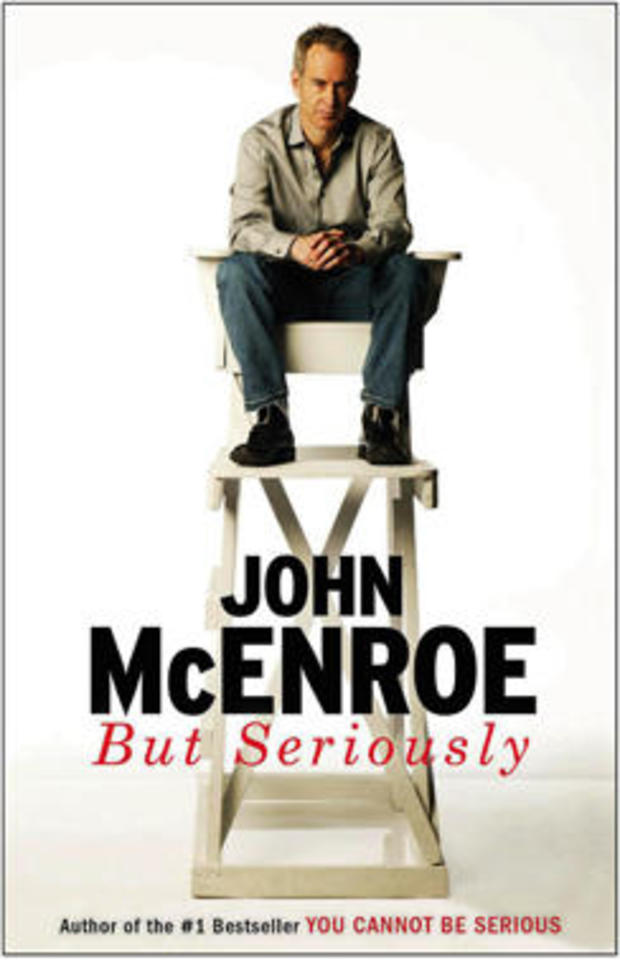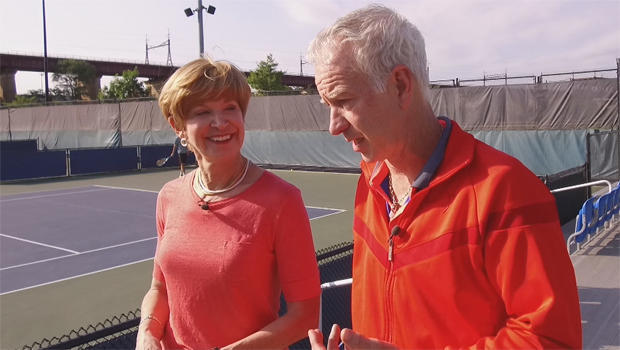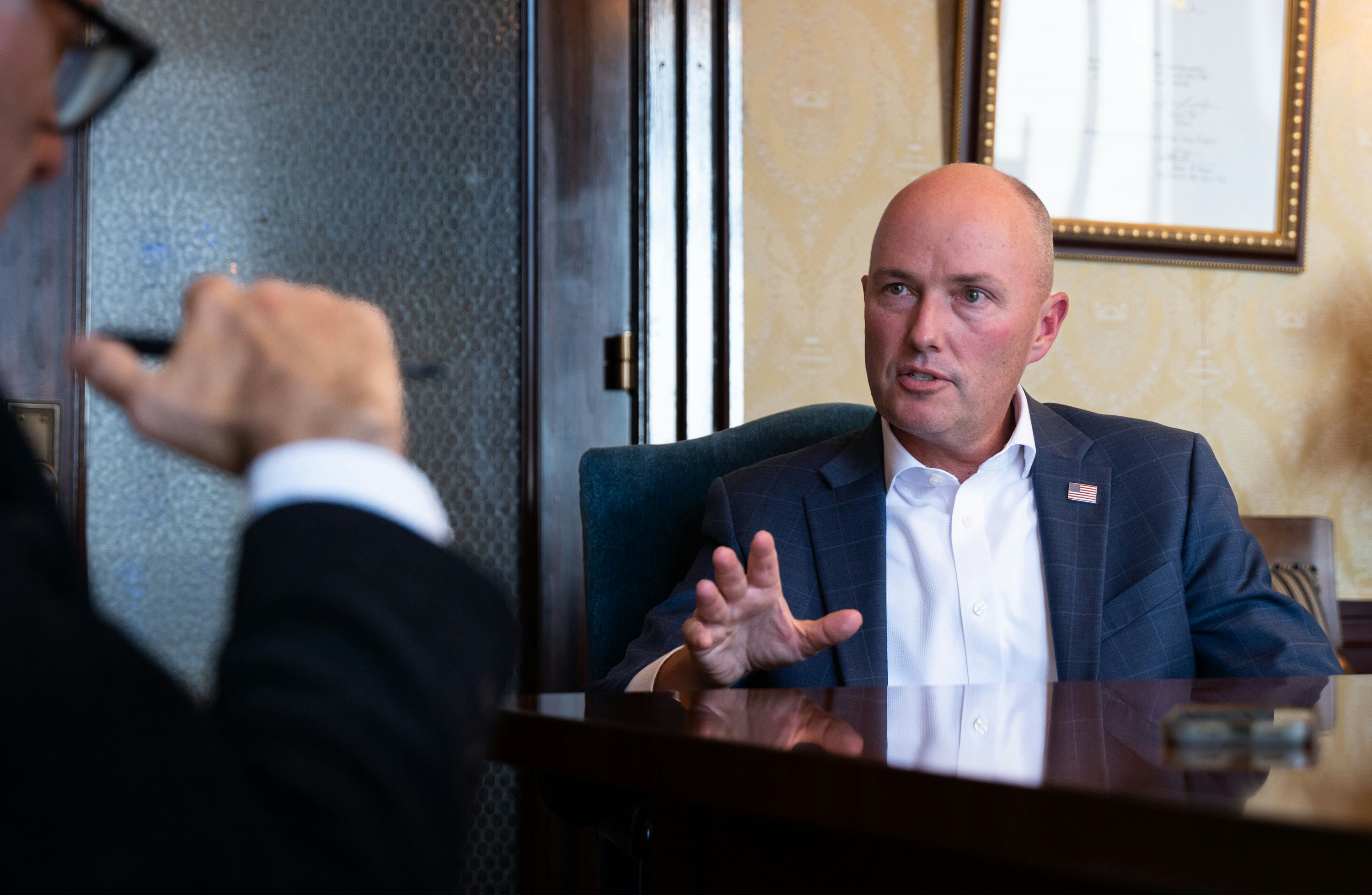John McEnroe: Seriously
Tennis great John McEnroe's outbursts grated on the nerves of many a harried umpire back in the day. He talks about that and more this morning with Susan Spencer:
Four decades ago, John McEnroe stormed onto tennis' genteel courts, smashing conventions, and occasionally rackets.
"I think I created some people that wouldn't normally watch tennis -- which was one of my goals," he said.
He battled the other greats of the time: Bjorn Borg, Jimmy Connors, Ivan Lendl … and he battled any umpire he thought was wrong. He thought a LOT of umpires were wrong.
"You seemed to push it right up to the line," Spencer said.
"I'm not the only one. I mean, you gotta sort of be aware of what you can and can't do. They do that all the time in other sports. 'Oh my God, you took it to the line! Wow!' Of course I took it to the line!"
After all, he figured they'd never actually throw him out.
"They don't want to get rid of one of the best guys, if he's bringing in ratings and interest," McEnroe said. "So, I mean, that's part of the incentive of getting good, because you get away with more."
The line "You cannot be serious," famously uttered to an umpire at Wimbledon in 1981, became McEnroe's catch-phrase, and the title of his first autobiography -- followed now by a second, ""But Seriously" (Little, Brown). If there's a common theme, it's intensity, that spark lit long ago by his father back in Queens.
"My late father, he managed me, so he was great early on. He said, 'Listen, you don't need to do this, you're better than them!' You know, I mean, it was a loud dinner table at my house!"
He started playing tennis at eight, and quickly climbed through the junior ranks.
At 18, as an amateur, he stunned even himself by making the semi-finals at Wimbledon.
The critics could harrumph about "Superbrat" all they wanted, but he was ranked number one in men's tennis from 1981 to 1984.
Spencer asked, "Do you think it helped or hurt your game?"
"I think it helped it at some times, and it hurt it at others," he replied. "You know, it cost me some big matches."
Because? "I hurt myself by getting involved in stuff where the crowd would turn on me, and the momentum would shift. And I wasted unnecessary energy and I screwed myself."
By his mid-20s, McEnroe was on top of the world -- travelling, hanging out with rock stars -- but beginning to feel pressure from younger, fitter players.
Adding to that pressure: He met actress Tatum O'Neal, and was caught up in the whirlwind of her notorious Hollywood family.
"I never was in the National Enquirer," McEnroe said. "And I was, like, 'What the hell is goin' on here?"
"You weren't prepared for that?"
"In retrospect, I would say that the safe answer would be no."
McEnroe and O'Neal married, had three children, and tried for a normal life. "I had a kid when I was 27," he said. "And I took about six months off at that time. And the plan was, Okay, you're going to sort of regroup, you've been going hard for eight, nine years. The game's changing. There's a lot more power. And you're gonna figure out a way to come back a better player.
"That was the plan. Didn't work out that way!"
"How did it work out?" Spencer asked.
"It worked out that I wasn't as good a player."
McEnroe did not win another Grand Slam singles title after the age of 25. He and O'Neal divorced after eight years. Their custody agreement required him to take anger management classes.
Then, in 1993, life took a dramatic turn. He met someone new. He was impressed; she, not so much.
"I didn't really follow tennis. I mean, I knew who he was. I knew he yelled at people, but that's all I knew!" said Patty Smyth, who was the lead singer of the band Scandal, and fresh off a hit duet with Don Henley of The Eagles. Even so, she found McEnroe's brand of fame somewhat bewildering.
Spencer asked, "You say that you think John inspires real love and real hate at the same time. What did you mean by that?"
"You weren't talking about yourself, right?" McEnroe interjected.
"Not me, baby! I know you. People really feel like they know him because he's so familiar to them. He stood up to The Man and he challenged them and he said (you can bleep this out) 'F*** you, okay. I'm not gonna take it, all right?' And so, there were a lot of people who were like, 'Yeahhhh!' -- maybe people who didn't have the nerve to do it themselves in their own life.
"And then when they maybe get up the nerve to come over and ask John for yet another selfie while we're in the middle of a romantic dinner, and John says, 'No, not right now. It's not a good time,' they go right to, 'I knew you were a f****** a******.' It flips so fast!"
If his image hasn't changed much over the years, his interests certainly have. On tour long ago, he used to kill time in museums, and today has a love for contemporary art.
He has his own invitation-only gallery in New York City.
"I relate to artists a lot," he said. "Because they're out there by themselves, like tennis players. And they're basically stripped naked."
But what's really fascinated -- and perhaps frustrated -- him is music. A fair guitarist, he'd played with the best. So, soon after he and Patty married in 1997, he had a bright idea: He wanted to join her band.
"Yeah, of course he did," said Smyth. "And he'd also want to be the lead singer in my band, okay?"
"No, no, no," he laughed.
Smyth, who gave up her music career for several years to care for their combined six children, finally did what all those umpires of old had so wanted to do: She told him, in effect, to shut up.
"You get one amazing gift, like John got. You don't get two. Sorry!" she laughed. "To go from anything to a musician, it's not allowed. I don't know why, but the public does not want that, ever."
That ended that. But …
"You also say that, even now, he's a little self-centered?" Spencer asked.
"Yes. Yes. Hard to believe."
"And your point is?" laughed McEnroe. "Aren't we all?"
"He just has been John McEnroe since he's, you know, 17 or 18 years old," said Smyth. "The world was at his feet and he really didn't have to do a lot of the living of life that most people have to do. But I think tennis players have to be self-centered. They have to be selfish, they have to be driven. And I think that's part of his beast."
Married for 20 years, the McEnroes will soon be empty-nesters. Patty is working on new songs. John plays in senior events and exhibitions.
And he looks for the next great star among the young players training at his tennis academy in New York City. His message to them seems to be: Do what I say, not exactly what I did.
"Don't beat yourself," McEnore told his students.
"Have you ever beat yourself?" asked one young girl.
"That is a great question. And the short answer is that never once in my life have I beaten myself. If you believe that, I'll tell you another one! I probably have beaten myself. But I tried to learn from that when I did. Here's a secret ... sometimes I went a little too far!"
In just over a week, stuffy olde England will again play host to that brash American, John McEnroe -- this time on the sidelines at Wimbledon to provide TV commentary ... as if he could really be sidelined.
Spencer asked, "When they're doing your commentary, do you mentally put yourself on that court and wonder how you compare?"
"Well, you always do that," he replied. "My best against their best."
"Exactly. How would you do?"
"Oh, I'd kick their ass!" he laughed.
For more info:
- "But Seriously" by John McEnroe (Little, Brown); Also available in Large Print Hardcover, eBook, Digital Audio Download and Audio CD formats
- John McEnroe Gallery, New York City
- John McEnroe Tennis Academy





